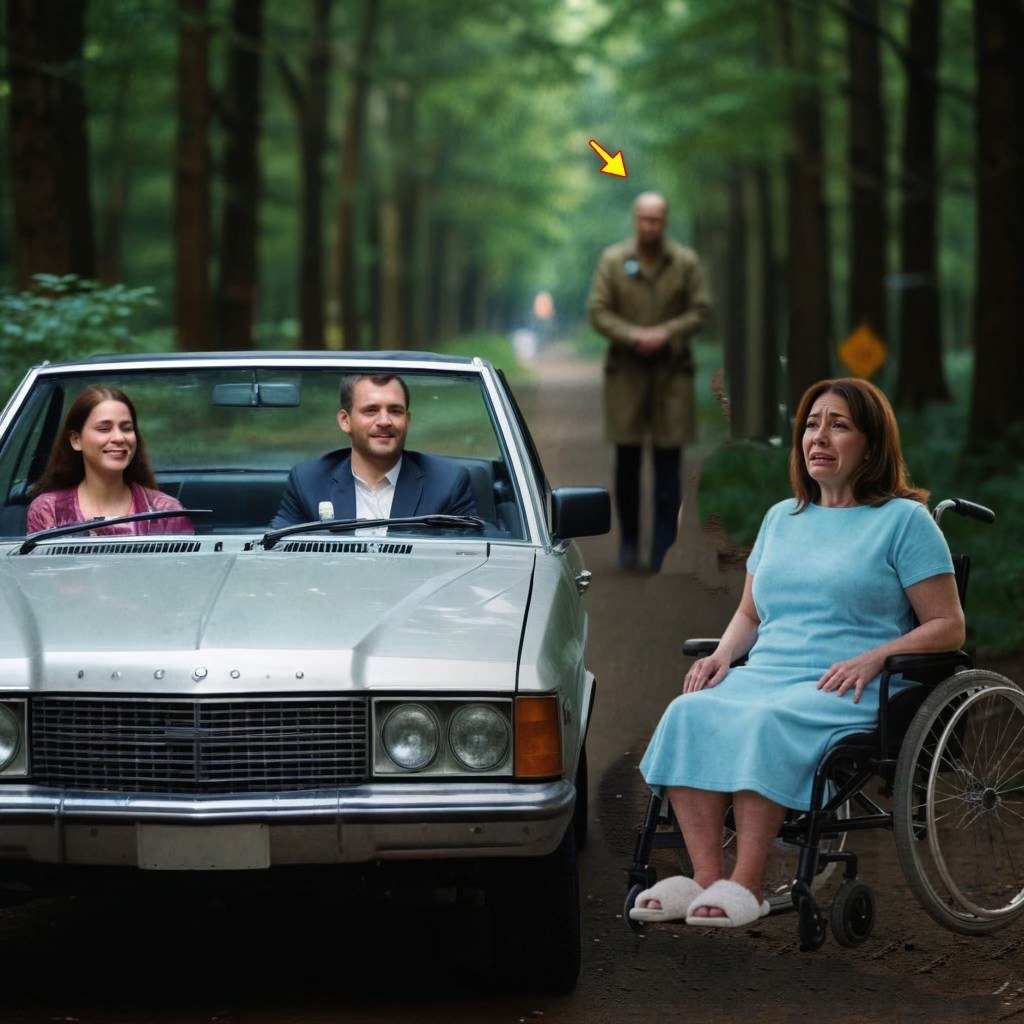Emma Johnson hated long car rides. The winding roads through Colorado’s dense pine forests always made her nauseous, but she stayed silent. She had been quiet most of the morning.
Michael, her husband of seven years, kept his eyes fixed on the road, his expression unreadable. His right hand tapped a nervous rhythm on his leg while classical music hummed softly through the speakers. They were headed to a cabin near Tranquil Lake, a place they hadn’t visited since their honeymoon.
Back then, they were in love, tipsy on cheap wine, daring each other into the icy lake and laughing like they had all the time in the world. Now, the car felt colder than that water had ever been.
“Snow tonight,” Michael said, breaking the silence.
Emma stared out the window. Dark clouds stretched low across the sky. “Did you bring the blankets?”
He nodded. “In the back. Cabin has heating.”
After a pause, he added, “This will be good for us.”
She almost smiled. “I’m glad you wanted to get away,” she said gently, unsure if it was a question.
He didn’t answer. Instead, he turned onto a gravel path marked by a crooked wooden sign: Tranquil Trail — Restricted Access.
Emma frowned. “This isn’t the way to the lake.”
“It’s a back route. Quieter.”
The trees closed in around them. The GPS signal vanished. Emma’s nerves prickled.
“Mike… this feels wrong.”
He kept driving. “You’ve been anxious lately.”
Her jaw tightened. “Lately” implied this was sudden—like her trauma was an inconvenience, not the aftermath of being paralyzed in a crash that changed her life. She hadn’t walked since. Every bump reminded her.
“Do you even like me anymore?” she whispered.
Michael let out a dry laugh. “Why would I bring you here if I didn’t?”
The road ended in a small clearing. No lake. No cabin. Just trees and silence.
“This isn’t the lake,” she said.
“I know,” he replied and got out.
He opened her door, undid her harness, and moved with mechanical precision. Not kind. Not slow. Just functional. Emma’s heart pounded.
“What are we doing here?”
“I want to show you something.”
He unfolded her wheelchair and placed her in it. No tenderness. No words. Just action.
She tried to resist. “Michael, stop—”
He pushed the chair fast, toward a bluff overlooking the lake. The slope was steep, muddy, impossible.
“I’m sorry,” he said quietly. “But I can’t do this anymore. I tried.”
Her mouth opened, but nothing came out.
“You used to be everything,” he said, voice detached. “Now it’s like you’re not even here, and I’m buried with you.”
He let go of the chair and turned away.
“Michael!” she screamed.
He didn’t stop. Gravel flew as the car disappeared into the trees.
She was alone.
Emma sat frozen, rain beginning to fall. Her hands trembled as she reached for her phone. No signal.
She looked down the slope. Too steep. Too rough. She was trapped.
Then—footsteps. Human. Deliberate.
A man stepped from the woods, tall, rifle slung across his back, a hood shadowing his face.
“I’m not trespassing,” she said quickly. “My husband left me. I didn’t mean to be here.”
The man pulled back his hood.
Her breath caught. “Chris?”
His face, older and lined, mirrored her shock. “Emma?”
He crouched beside her, steady hands assessing.
“Are you hurt?”
She shook her head. “Just cold. And… I don’t know what to say.”
“Start with this: did he leave you here?”
Her voice cracked. “Yes.”
Chris stood. “You’re coming with me.”
He gently pushed her away from the bluff.
“I can do it,” she said reflexively.
“I know. But not here.”
He lifted her with ease. “I’ll get the chair later.”
As he carried her through the woods, she whispered, “I didn’t know you were back.”
“Moved here a few months ago.”
They reached his truck. He placed her inside gently, then returned for her wheelchair. The engine roared, warmth filling the cab.
“I don’t understand why he did it,” she said quietly.
“I do,” Chris replied. “Men like him—when the woman changes, they break. Because their love was always about convenience, not commitment.”
The cabin was modest, warm, and quiet. Chris set her on the couch, offered her tea, and kept his distance—but never let her feel alone.
Later, they talked. About the accident. The control Michael had taken—over her finances, her social life, her passwords. About how it became a prison dressed in concern.
“He didn’t just leave you,” Chris said. “He planned to erase you.”
She nodded. “He knew I wouldn’t survive the night.”
But she had. Because someone had seen. Someone had cared.
Emma stayed at the cabin. They built a case—emails, bank records, old design files proving the business had been hers long before the accident. Every step was slow, methodical. Chris never rushed her. He believed her without question.
Then came the final blow: a recovered email thread from Michael, planning “phase two” with his assistant Vanessa.
“He was going to take it all,” Emma said. “My work, my name, my voice.”
Not anymore.
They recorded her story—on her terms.
It went viral.
Michael’s version unraveled in real time. By the time police arrested him, Emma’s evidence had already sealed his fate.
Six months later, her life was her own. She stood at the front of her new office—Clarity Design Co.—a business rebuilt by her, for people like her. Accessible, inclusive, honest.
Chris stood beside her, always quiet, always steady.
“Are you happy?” he asked one day.
“I’m not there yet,” she said. “But I’m whole. And I’m not hiding anymore.”
He nodded.
“Why Clarity?” he asked.
She smiled. “Because I spent too long being rewritten. Clarity is me writing it back.”
They didn’t need to say anything else.
They walked forward—together—not toward safety, but toward something she’d earned: her story, her strength, and a future written in her own voice.
